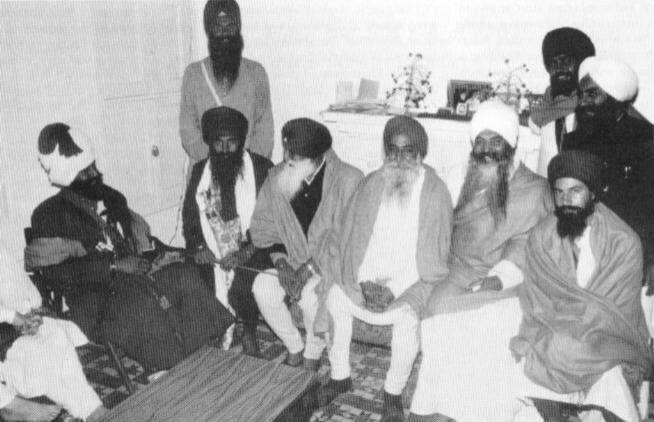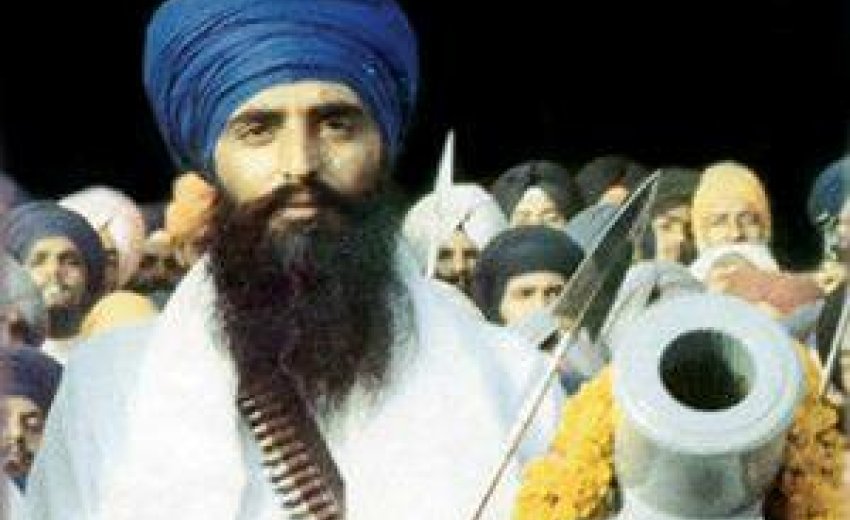'If we speak to someone with hatred and try to assert our superiority, it will create hatred in the minds of everyone. So long as we have the spirit of love, so long as we have the support of Satguru Hargobind Sahib, the Master of Miri and Piri, is there any power on earth that can subdue us?'
Jarnail Singh Bhindranwale was the leader of the Damdami Taksal, a Sikh religious group based in India. Sant Bhindranwale carried heavy influence among many Sikh youth in Punjab during his time at the top of Sikh religion. He spread the original values of Sikhism and persuaded people young and old to follow the original rules and tenets of the religion. In 1981, Sant Bhidranwale was arrested for his suspected involvement in the murder of Jagat Narain, the proprietor of the Hind Samachar Group. Although he willingly surrendered to police he was later released due to lack of evidence. Sant Bhindranwale is more notable for his involvement in Operation Bluestar in which he and other freedom fighters occupied the Akal Takht complex, including the Golden Temple, in Amritsar. For years it was maintained that he had survived the attack and was in seclusion, but many people stated that they had seen his body among the dead Martyrs. In the days before the attack he had denied the wishes of one of the later Martyrs in the skirmishes with the Police and Indian Army across Punjab, who had asked to stay and die as a Martyr in the coming battle. In the same way that the Sikhs in the Haveli at Chamkaur had 'voted' to press a reluctant Guru Gobind Singh to escape and live to fight another day, he told his friend that he had to live to fight and organize later battles, because all that had chosen to stay with him to defend the Akal Takhat and the Harmandir Sahib had taken an oath to die as Martrys in the manner of Baba Deep Singh Shaheed fighting to the last drop of their blood.
Sant Bhindranwale is more notable for his involvement in Operation Bluestar in which he and other freedom fighters occupied the Akal Takht complex, including the Golden Temple, in Amritsar. For years it was maintained that he had survived the attack and was in seclusion, but many people stated that they had seen his body among the dead Martyrs. In the days before the attack he had denied the wishes of one of the later Martyrs in the skirmishes with the Police and Indian Army across Punjab, who had asked to stay and die as a Martyr in the coming battle. In the same way that the Sikhs in the Haveli at Chamkaur had 'voted' to press a reluctant Guru Gobind Singh to escape and live to fight another day, he told his friend that he had to live to fight and organize later battles, because all that had chosen to stay with him to defend the Akal Takhat and the Harmandir Sahib had taken an oath to die as Martrys in the manner of Baba Deep Singh Shaheed fighting to the last drop of their blood.
Sant Bhindranwale was born in the village of Rode, in the Faridkot District of Punjab. His father, Joginder Singh, was a farmer and a local Sikh leader who had one daughter Manjeet Kaur and seven sons, of which Jarnail Singh was the youngest. Jarnail Singh was brought up as a strict vegetarian. His six brothers were Jagir Singh, Jagjit Singh, Jugraj Singh, Harjeet Singh, Veer Singh and Captain Harcharan Singh.
Sant Bhindranwale took Amrit (Khande ka Pahul) at the age of five years. His early education was in goverment primary school, where he studied until the fifth grade. Bhindranwale took up farming until 1964. When in those days Sant Gurbachan Singh Bindranwale came to village Rode, where Sant Jarnail Singh joined the Damdami Taksal (Jatha Bindran), based in the village of Mehta Chownk. The Damdami Taksal is a traveling Sikh university, which originated in the times of Guru Gobind Singh. The first Jathedar (head/leader) of the Taksal was Shaheed Baba Deep Singh.
Sant Gurbachan Singh Khalsa Bindrawale was the 12th Jathedar of the Taksal. Under his guidance, Sant Jarnail Singh began a year long course in spirtual, scriptual, theological and Sikh historical studies. A year later, Sant Jarnail Singh went back to his village and settled back to farming. In 1966 he was married to Bibi Pritam Kaur, daughter of Bhai Sucha Singh of Bilaspur. His wife bore him two sons, Ishar Singh and Inderjit Singh, in 1971 and 1975, respectively.
Rise to Fame
In Punjab, Sant Bhindranwale went from village to village as a religious missionary talking with Sikhs. He asked them to live according to the rules and tenets of Sikhism. He would give long speeches and encourage numerous youths to take Amrit, the holy nectar. Bhindranwale preached to the young Sikhs who had lost their path, encouraging them to return to the path of the Khalsa by giving up vices like alcohol, tobacco, drugs, prostitution or any other addictions which would affect them mentally or physically.

Sant Ji and friends in 1981
Sant Bhindranwale first participated in politics in 1979 putting up forty candidates in the SGPC elections for a total of 140 seats, of which only four were elected. A year later, he campaigned actively supporting candidates for Congress in three constituencies during the general elections, but he did not seek any political office for himself. In response to questions asked about his political ambitions he replied: "If I ever became president of the Shiromani Akali Dal or the S.G.P.C. [Shiromani Gurdwara Parbandhak Committee], an M.L.A., a government minister, or a member of parliament…I shall deserve a shoe-beating from the sikh panth."
By 1982-83 Sant Bindranwale had become so popular with the Sikhs of Punjab that the people came to him for justice, side-stepping the usual arbitrators. As stated in a 1984 Time Magazine article, Sant Bhindranwale had become so popular that he had usurped the authority of the Shiromani Akali Dal, a Punjab-based Sikh political party. Sant Bhindranwale wielded a great deal of power and the political factions in Punjab did not commit any major action without thinking about what his response might be.
"I am her father, take what ever you want!"
One day a young Hindu wife came to see Bhindranwale. She bowed and clutched at his feet (this is an old and honored tradition of India done to show respect to ones elders) and sobbed out her story of how she was being maltreated by her husband's family, for failing to extract more money from her parents. She also complained of her husband's unwillingness to take her side. Bhindranwale asked her name and where she lived. "So you are a daughter of the Hindus," he said. "Are you willing to become the daughter of a Sikh?" She nodded (approval). Bhindranwale sent a couple of his armed guards to fetch the girl's family. An hour later a very frightened trio consisting of the girl's husband and his parents were brought before him. "Is this girl a daughter of your household?", he demanded. They admitted she was. "She tells me that you want money from her father. I am her father." He placed a tray full of currency notes before them and told them: "take whatever you want". The three fell at his feet asking forgiveness.'
After Independence, the Congress leaders of India forgot their promises, given to the Sikhs to secure their support in backing the partition of Punjab. These very same Congress leaders were later to adopt every conceivable posture, shranking from no stratagem to keep the Sikhs stateless and not allowing Punjabi to be recognized as an official language of India. At the time the former colonial kingdoms and Princely States were being divided along language differences. The Sikhs and Punjab were denied any special status in the Constitution Act of India.
Death
On June 3, 1984 Indian Prime Minister Indira Gandhi initiated Operation Bluestar and ordered the Indian Army to surround the Golden Temple complex to kill the militants in the complex. It was widely reported that Bhindranwale did not survive the operation and is thus regarded as a "Martyr" by Sikhs.
According to Lieutenant General Kuldip Singh Brar, who commanded the operation, the body of Bhindranwale was identified by a number of agencies, including the police, the Intelligence Bureau and Sikh fighters in the Army's custody. Bhindranwale's brother is also reported to have identified Bhindranwale's body. Pictures of what appear to be Bhindranwale's body have been published in at least two widely circulated books, Tragedy of Punjab: Operation Bluestar and After and Amritsar: Mrs Gandhi's Last Battle. BBC correspondent Mark Tully also reported seeing Bhindranwale's body during his funeral.
People who maintain that he survived the operation include Dilbir Singh, the Public Relations Advisor at Guru Nanak Dev University. He stated that Bhindranwale was injured on the right side of his temple. He stated, "A government doctor verified he was captured alive. He was tortured to death."
R.K. Bajaj, a correspondent for Surya magazine, claimed to have seen a photograph of Bhindranwale in custody. This claim is strongly contested, especially by Bhindranwale's son who has now become a prominent figure within Sikh politics. Some within the Damdami Taksal claimed he is still alive. However, Jarnail Singh was pronounced a martyr by the Shiromani Gurdwara Parbandhak Committee at a function in 2003.
